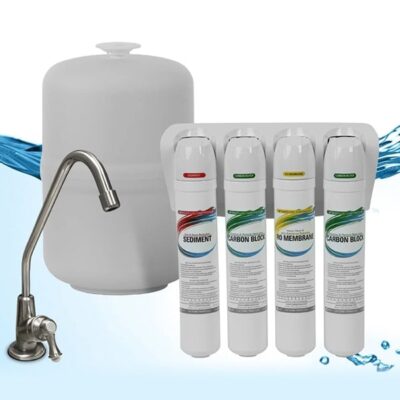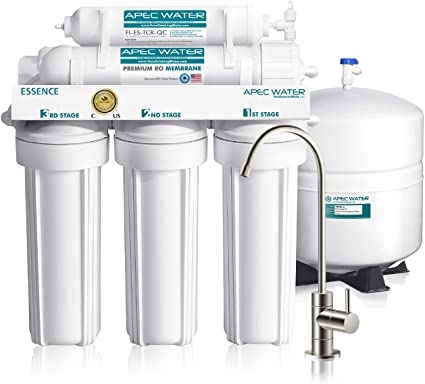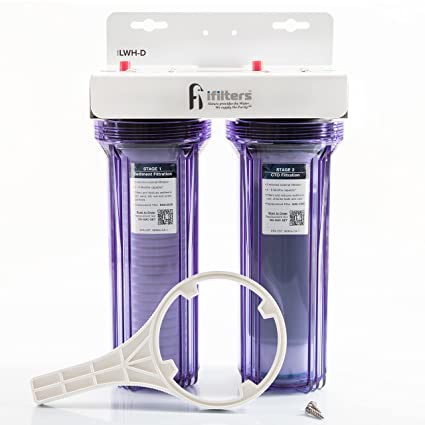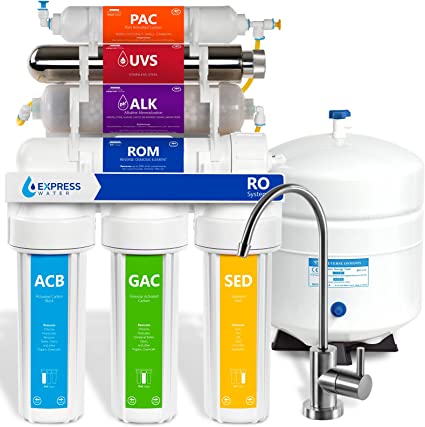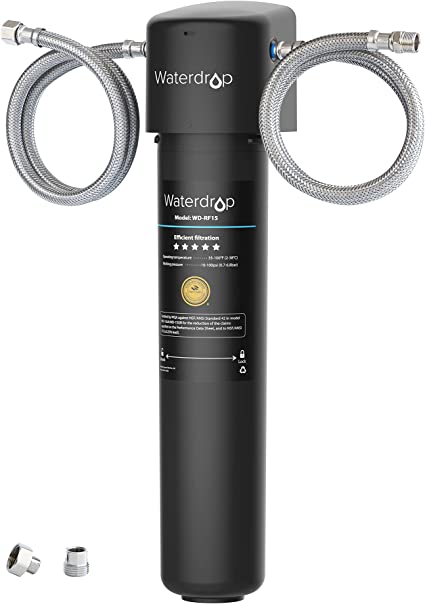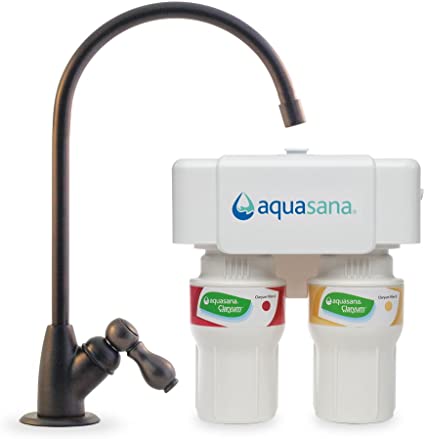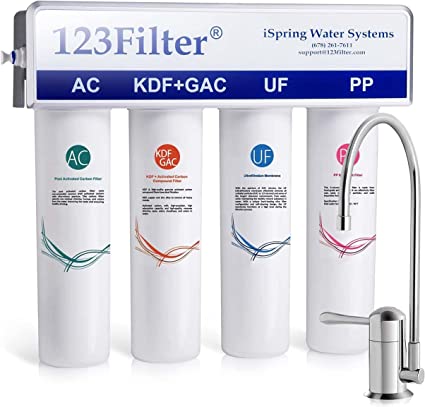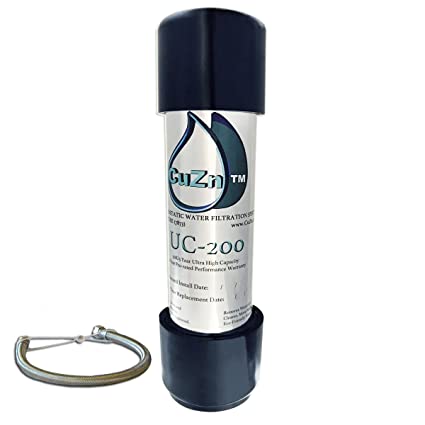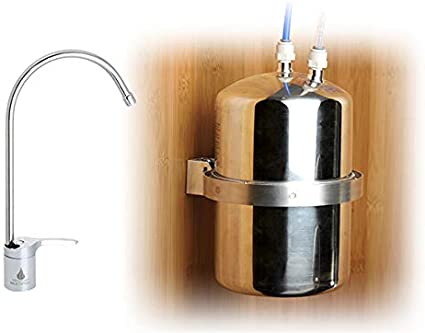Well water is generally safe for drinking and cooking. However, groundwater can get contaminated due to several reasons; damaged well casing or cap, underground contamination, or contamination from plumbing pipes. The list goes on.
Water quality matters the most for drinking and cooking. Hence, you need topnotch filters for drinking water. An under sink water filter for your kitchen can do it for you.
If you are looking for an under sink water filter for well water, you are at the right place. In this article, you will find the 9 best under sink water filters for well water. Buying a water filter with misleading claims, difficult installation, short filter life, and poor filtration capabilities is easy. There is a flurry of such filters in the market. We scrutinized each filter, so you don’t face any troubles in the long run.
The 9 Best Under Sink Water Filter of Well Water
What’s on this page
- Our Top Picks
- Comparison Table
- Buying Guide: Factors to Consider before Buying an Under Sink Water Filter for Well Water
- Review of Our Top Picks
- Frequently Asked Questions
Our Top Picks
- Editor’s Choice: SpringWell Reverse Osmosis Drinking Water System
- Best 5 Stage Reverse Osmosis: APEC 5-Stage Reverse Osmosis Drinking Water Filter System
- Best 2 Stage Under Sink Water Filter for Well Water: iFilters Whole House Water Filter 2-Stage
- Best for Extremely Contaminated Water: Express Water UV RO 11-Stage Filter
- Best High Capacity Under Sink Well Water Filter: Waterdrop 15UA Well Water System
- Best 2 Stage Under Sink Well Water Filter with Faucet: Aquasana 2-Stage Under Sink Water Filter System
- Best Sediment & Carbon Under Sink Water Filter: iSpring 4-Stage Under Sink Water Filter
- Best Under Counter Well Water Filter for Bacteria: CuZn Under Counter Water Filter with High Capacity
- Best Reverse Osmosis for Small Spaces: Multipure Aquaversa MP750 RO Water Filter
Comparison Table
Filter Image Filter Type Filtration Stages Capacity Flow Rate Certification Warranty Dimensions Price SpringWell Reverse Osmosis Filter Reverse Osmosis 4 75 gallons/day NSF/ANSI P473 & NSF/ANSI 53 Lifetime on tanks & valves - APEC 5-Stage Reverse Osmosis Reverse osmosis 5 50 gallons/day 1 gallon/minute WQA, NSF/ANSI 1-year 16 x 5.25 x 17.5 inches iFilters Whole House Water Filter 2-Stage Sediment & carbon filter 2 6 months 3 gallons/minute NSF 1-year 18 x 12 x 6 inches Express Water UV RO 11-Stage Filter Reverse osmosis 11 4 gallon tank 2 gallons/minute NSF 1-year 19 x 15 x 5 inches Waterdrop 15UA Well Water System Sediment & carbon filter 1 16000 gallons 0.75 gallons/minute WQA, NSF/ANSI 1-year 3.6 x 3.9 x 16.7 inches
Buying Guide: Factors to Consider before Buying an Under Sink Water Filter for Well Water
Under sink systems filter drinking and cooking water. Hence, you must carefully vet your options. Here’s a rundown of factors you need to consider before buying your next under sink filter for well water.
Contaminants and Filtration Capabilities
Private water wells must be tested at least once a year to determine water quality and identify the contaminants. Only then can you know which water filter is best for you. Even city water users must obtain a water quality report from the local government before buying a water filter.
Type
The common types of under sink well water filtration systems are discussed below.
Reverse Osmosis: RO systems remove almost all the contaminants in the water. The RO membrane is so small that it hardly allows water molecules to pass through. RO filters waste 1-3 gallons water for 1 gallon of filtered water. Most RO systems come with a separate faucet. RO filters are costly compared to other filters and have a slightly complex DIY installation.
Sediment Filters: Sediment filters are usable when well water doesn’t have any toxic contaminants. Most sediment filters can remove debris, suspended particles, and rust particles. A carbon filter often accompanies sediment filters. A sediment filter is present in almost all water filters. You can use these filters under the sink, for the whole house, and point of use.
Ultrafiltration: Ultrafiltration systems work like RO filters but don’t remove TDS and as many contaminants as RO systems. They are fit for water supply with sediment, VOCs, chlorine taste and smell, iron, and other heavy particles.
Carbon Filters: Carbon filters are the most common filters used in homes with well water. These filters are also a part of almost all filters on the market. The activated-carbon bonds with VOCs in water and removes them. It also improves the aesthetic quality of water.
Size and Capacity
Buy a system that can filter water as per your needs. Go for a bigger and more powerful option if you have a big family or use water for commercial needs. Each water filter has a different capacity. RO systems can filter 50-75 gallons in a day. They are best for large homes.
For small families, a smaller filter is recommended. It is easier and cheaper to maintain a small filter in the long run. Moreover, the initial cost is also less for small filters.
Flow Rate
Flow rate describes how fast the filter delivers water. It is usually measured in GPM. The average flow rate of an under sink water filter is 0.8-2.0 GPM. The flow rate is dictated by incoming water pressure and the unit’s filtration ability.
The diameter of plumbing pipes also determines the flow rate. Usually, filters with a separate faucet have a higher flow rate than those relying on sink faucets.
Filter Life
Filter life is controlled by two things; water quality and usage. The average life of most filters is 4-6 months for RO systems, sediment, and carbon filters. Some filters may last up to 2-5 years.
Installation and Maintenance
There is no point for a professional installation for under sink water filters. Hence, select a unit that comes with all installation hardware. You’ll need to replace the filter, deal with leaks, check flow rate, and bypass filters in the long run.
Faucet Attachment
Many under sink well water filters come with a separate faucet. These faucets allow you to wash dishes, fruits, and vegetables with filtered water.
If you buy a filter with the faucet, don’t forget to see if your sink has a spare hole or if you need to drill a new one.
Cost
Make sure you check the filter replacement cost apart from the initial cost. You will be regularly making this expense.
Warranty and Certifications
Certifications from NSF, ANSI, and WQA add weight to the manufacturer’s claims of filtration capabilities. It is always beneficial to buy a filter with certifications. Moreover, check that the unit has some warranty. Most under sink filters have a 1-year warranty.
Review of Our Top Picks
1. Editor’s Choice: SpringWell Reverse Osmosis Drinking Water System
Features
- Filter Type: Reverse osmosis
- Filtration Capacity: 75 gallons per day
- Tank Capacity: 3.2 gallons
- Warranty: Lifetime on tanks & valves
SpringWell’s RO drinking water system is the best under-sink filter for well water. SpringWell is one of the few brands that make filters specifically for well water. The filter removes heavy metals, VOCs, chemicals, chlorine (taste & odor), chloramine, and up to 99% of all the contaminants in well water.
The 4-stage filter has a daily filtration capacity of 75 gallons. No matter how big your family is, you’ll never fall short of purified water for drinking and cooking. The filter comes with a 3.2-gallon storage tank, so you have ample drinking water all the time.
The 4 filtration stages include a sediment filter, RO membrane, and 2 carbon filters to provide 100% purified drinking water. The only problem is the missing remineralization stage.
The unit comes with all the installation supplies and a lead-free faucet. You’ll need common household tools and some plumbing knowledge for a DIY installation.
Homeowners who used the filter praise it for water taste and purity. It removes all the contaminants and makes water safe for your family. Buyers are also amazed by its build quality and long filter life.
Pros
- 9-12 months filter life
- Big storage tank
- Sturdy filters
- 100% lead-free faucet
Cons
- Costly
2. Best 5 Stage Reverse Osmosis: APEC 5-Stage Reverse Osmosis Drinking Water Filter System
Features
- Filter Type: Reverse osmosis
- Capacity: 50 gallons per day
- Flow Rate: 1 gallon per minute
- Warranty: 1 year
The 5-stage reverse osmosis filtration system removes all contaminants from well water. The WQA-certified filter can remove chlorine, VOCs, taste and odor from water, fluoride, arsenic, lead, nitrates, heavy metals, and various other contaminants in water,
The 5 filters include a sediment filter, two carbon block filters, a high rejection RO membrane with 99% contaminant removal, and a refining coconut carbon filter to remove any leftover taste and odor.
The system is 100% lead-free and made from food-grade tubing and ports, so you get safe and pure water for drinking and cooking.
All the parts required for installation are included in the box. The included guide and online videos facilitate DIY installation. Apec has 24/7 customer service to help you during the installation process.
Homeowners using well water and this filter are 100% satisfied with its performance. They mention that pre and post-installation water quality tests support the manufacturer’s claims. Homeowners with extremely hard water, high iron content and toxic contaminants recommend this filter to all private well owners. It also works in homes that get water from a community well.
Pros
- Great value for money
- Compact; fits in tightest of spaces
- Easy DIY installation with clear instructions
- Removes TDS (Total Dissolved Solids)
- Highly responsive customer service
- Leak-free
Cons
- None so far
3. Best 2 Stage Under Sink Water Filter for Well Water: iFilters Whole House Water Filter 2-Stage
Features
- Filter Type: 2-stage sediment and carbon
- Filter Life: 6 months
- Flow Rate: 3 gallons per minute
- Warranty: 1-year
This filter is for homes with better quality private wells. The 2-stage filter removes sediment, dirt, sand, rust particles, chlorine taste and odor, and some VOCs in water. It cannot remove contaminants like lead, arsenic, and TDS.
This filter is best for increasing the aesthetic quality of water. The first stage is a sediment filter with a 5-micron rating. The second stage is a carbon block filter that removes chlorine taste and smell.
It is a versatile filter and can be used as a whole house, under sink, or inline water filter. This is possible due to a large surface area and fast flow rate of 3 GPM. The clear housings indicate when you need to replace the filter. The advertised life of the filter is 6 months, but the actual life depends on water quality and usage.
The installation and maintenance are easy. Everything required to install the system comes in the box. It includes a housing wrench for easy maintenance and filters replacement.
The user feedback for this filter is great. Homeowners with well water are happy with its performance. Some people install it before other filters for enhanced sediment filtration, while the majority use this as an under sink filter.
Pros
- Easy installation & maintenance
- Good value for money
- Fast flow rate
- Clear housing
Cons
- Bulky compared to other 2-stage systems
Check out the Best Filter Pitchers for Well Water here!
4. Best for Extremely Contaminated Water: Express Water UV RO 11-Stage Filter
Features
- Filter Type: Reverse osmosis with UV & remineralization
- Capacity: 4-gallon tank
- Flow Rate: 2 gallons per minute
- Warranty: 1-year
What do you do when your well water is contaminated to the highest level? You install a high-end water filter. The Express Water 11-stage RO water treatment system is best for homes with highly contaminated private water or city water.
The 11 stages include one sediment filter, two carbon filters, one RO membrane filter, one alkaline mineralization stage, a UV stage, and post-activated carbon. Each stage performs its function and delivers 99.99% pure water for drinking and cooking purposes.
The first stage removes sediment; the next two improve water quality and remove VOCs. The 4th stage (RO membrane) is the heart of the filter. It has a 0.0001-micron rating. The next stage adds minerals (calcium, magnesium, and potassium) that were removed in the RO stage. The 2nd last stage kills bacteria, viruses, and other microorganisms in water. The last stage improves water taste.
This is a big unit, so check the available space before buying it. Its installation and maintenance are easy, and all the parts are made from food-grade plastic.
Please note that the system wastes 1-3 gallons of water for every 1 gallon of water it filters. If you are an eco-friendly folk or care about water resources, you may not like this system. Users are satisfied with the filter’s performance. Buyers mention that it is easy to install and delivers great quality drinking water.
Pros
- Comprehensive water treatment
- Long filter life
- Decent value for money
- Automatic leak detection
Cons
- High water wastage
5. Best High Capacity Under Sink Well Water Filter: Waterdrop 15UA Well Water System
Features
- Filter Type: Single cartridge
- Capacity: 16,000 gallons
- Flow Rate: 0.75 gallons per minute
- Warranty: 1-year
This filter is for homes with comparatively good quality water. If sediment, chlorine taste/smell, heavy metals, and VOCs are your main concerns, this filter has got you covered.
The most remarkable feature of this filter is its small size and big capacity. It is ideal for large families and commercial setups.
One filter lasts for two years or 16,000 gallons of water. The flow rate is 0.75 gallons per minute, and it doesn’t decrease no matter how much your demand is. However, the incoming water pressure may reduce the flow rate temporarily.
The filter is WQA, ANSI/NSF certified, and made from food-grade plastic. The installation is easy; you just have to hook up two pipes. It comes with all the things needed to complete a DIY installation.
It is a multi-purpose filter and can be used with city water, in offices, and RVs.
The customer feedback is good. Buyers are happy with its performance. However, some users are unhappy because it cannot reduce the total dissolved solids in water. A system with TDS removing ability is required for most private water supplies.
Pros
- Compact unit
- Easy hookup and easy maintenance
- Never leaks
- Big capacity
Cons
- No TDS filtration
- No water bypass
- Supply lines are flimsy
6. Best 2 Stage Under Sink Well Water Filter with Faucet: Aquasana 2-Stage Under Sink Water Filter System
Features
- Filter Type: 2 stage with faucet
- Capacity: 500 gallons
- Flow Rate: 0.5 gallons per minute
- Warranty: 1-year
An under sink well water filter with an additional faucet is slightly difficult to install, but it is a great addition to your kitchen. You can wash dishes, vegetables, and fruits with unfiltered water and use filtered water for drinking and cooking.
The 2-stage system can remove lead, mercury, asbestos, herbicides, pesticides, and other contaminants in water. It also traps sediments and rust particles in water to deliver clean and healthy drinking water. It uses NSF-certified Claryum filtration technology to reduce up to 97% of contaminants in well water.
One good thing about this filter is that it retains healthy minerals like calcium, potassium, and magnesium in water. The materials used are 100% food grade and BPA-free. The included faucet is made from metal and is 100% lead-free.
The installation process is easy. Everything required to complete a DIY installation is included in the box.
It is a costly filter. A high price is the main reason behind the low number of reviews on this filter. However, homeowners using well water are satisfied with its performance.
Pros
- Easy installation & maintenance
- Good tasting water
- Good looking faucet
Cons
- Slow flow rate
- The included fixture cover diameter is small. It doesn’t cover the hole completely.
7. Best Sediment & Carbon Under Sink Water Filter: iSpring 4-Stage Under Sink Water Filter
Features
- Filter Type: 4-stage ultra-filtration
- Capacity: 1100 gallons
- Warranty: 1-year
iSpring’s 4-stage ultra-filtration water treatment system is an excellent alternative to RO systems. It doesn’t waste water, takes up less space, and is cheaper than most RO systems.
The 4 filters include one sediment filter, an ultra-filtration membrane, an activated carbon filter, and a post-activated carbon filter. The ultra-filtration membrane makes this system more powerful than under-sink filters because it can remove contaminants as small as 0.01 microns. It will not allow anything other than water to pass through.
Though it works like an RO system, it cannot remove TDS from water. It can filter 1100 gallons on average. However, the actual life depends on incoming water quality and your usage pattern.
The unit comes with an additional metallic faucet. All the materials used are NSF and WQA certified, lead and BPA free. The DIY installation and maintenance make it easy to work with this system in the long run.
Many people use this filter for well water. One user mentions that it effectively reduces high magnesium in water, improves water taste, and removes smells. Other users highlight ease of installation and cooperative customer service.
Pros
- Leak-free snap-fit connections
- Twist-on filter replacement
- Compact
- Cheap replacement filters
Cons
- Doesn’t reduce TDS
8. Best Under Water Well Water Filter for Bacteria: CuZn Under Counter Water Filter with High Capacity
Features
- Filter Type: Single cartridge for bacteria
- Capacity: 50,000 gallons
- Warranty: 5 years
Though chlorination is the best way to remove bacteria from well water, some additional protection for private wells with high bacterial contamination is recommended. The single cartridge filtration system removes bacteria, sediment, chlorine taste, and smell from water.
Please note that this filter will not remove TDS from incoming water. The cartridges in the filter are bacteriostatic and don’t let bacteria or mold growth in the filter to deliver clean water for a long time.
The installation process is easy. It comes with all the hardware required for DIY installation. All you have to do is hang the filter and make the connections. It is also a compact unit, so you don’t have to worry about space.
There are 100s of positive reviews from homeowners using private wells. Users mention that they tested the water before and after installing this filter. It removes all the bacteria in water and makes it safe for drinking and cooking.
Pros
- Super easy to install
- Long filter life; 5 years
- Fast and helpful customer service
Cons
- Takes 7 days to get drinkable
- No filter replacement
9. Best Reverse Osmosis for Small Spaces: Multipure Aquaversa MP750 RO Water Filter
Features
- Filter Type: Reverse osmosis
- Capacity: 750 gallons
- Flow Rate: 0.75 gallons per minute
Many small cabins and huts use water wells as a drinking supply. These places don’t have much space for installing big units but still require a quality water filtration system. Multipure Aquaversa is a costly but compact unit with reverse osmosis filtration.
The filter size is only 5.8 x 5.8 x 8.5 inches, making it super easy to install in tight spots and cramped cabins. It can filter contaminants like sediment and improve taste and smell, VOCs, and TDS. The filter is NSF certified against 42 and 53 standards.
The filter comes with a separate metallic faucet. Overall, it is a good unit for compact spots but costly. Users are satisfied with its performance, but a few mention leaks and pressure drops even when the incoming water pressure is high. On the flip side, buyers praise its installation ease.
Pros
- Compact; smallest of all
- Economical filter replacement
Cons
- Costly
- Doesn’t filter arsenic and chrome
Frequently Asked Questions
How can I find the contaminants in my well water?
A water quality test will provide details about contaminants in water. Though you can test water at home, it is better to get it tested from a reputed and certified water testing facility.
Is an under sink water filter worth it?
Yes. Under sink water filters are the most practical, efficient, and cost-effective way of getting clean and healthy drinking and cooking water.
When do I need a reverse osmosis water filter?
A RO water filter is best for homes with multiple contaminants, TDS, and toxins that a sediment/carbon filter cannot remove.
How to install an under sink water filter?
The installation process is generally the same for almost all under sink water filters. You may hit a roadblock while installing a faucet, but that also requires some basic drilling.
- Turn off the water supply to your sink faucet and drain all water.
- Remove the cold water line and connect it to the inlet of your water filter.
- Connect the outlet port to the faucet.
- Connect the filters.
- Turn on the water supply and test the system for leaks.
When do I need to replace water filter cartridges?
It depends on incoming water quality, usage, and cartridges’ quality. The average life of a filter is 4-6 months.
